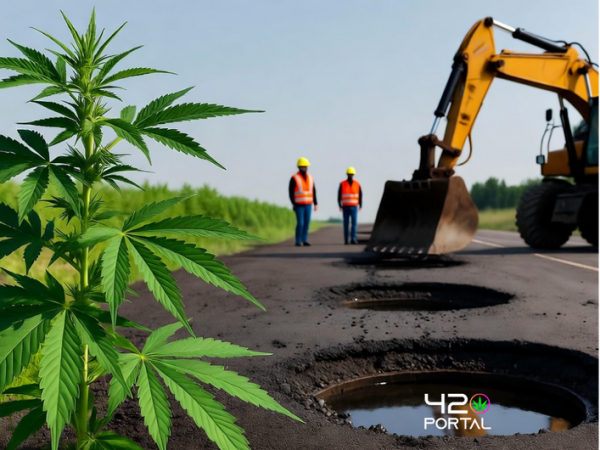Michigan Taps Cannabis Revenue to Tackle Crumbling Infrastructure

10/10/2025
Michigan's battle against its notorious pothole-plagued roads has taken a bold turn with the introduction of a new levy on cannabis transactions. State leaders have approved a 24% tax applied to sales between growers and retailers, channeling the proceeds into a comprehensive repair initiative. This measure, embedded in the $81 billion fiscal year 2026 budget, aims to generate $420 million annually to bolster crumbling highways, bridges, and local streets across the Midwest state.
The push for better roads stems from decades of neglect exacerbated by harsh winters, where freeze-thaw cycles wreak havoc on pavements. Michigan consistently ranks near the bottom nationally—40th in road quality and 28th in funding—leaving drivers dodging craters and facing steep vehicle repair costs. Lawmakers, after a tense standoff between the Democrat-led Senate and Republican-controlled House, finalized the budget just shy of a government shutdown. The agreement redirects all gasoline tax revenue solely to transportation projects, a shift from its prior heavy allocation to education, and injects about $1 billion yearly into community-level fixes.
This cannabis-funded approach builds on the state's 2018 embrace of recreational marijuana, which already imposes a 10% retail excise tax and 6% sales tax on consumers. The new wholesale tax pushes Michigan's overall cannabis levies toward the higher end among the 24 states with legal adult-use markets. Similar hikes have emerged elsewhere, from Minnesota to Maine, reflecting a growing trend of using emerging industries to plug fiscal gaps.
Critics warn of unintended fallout. Fiscal experts predict a 14.4% drop in legal sales as prices climb, potentially squeezing small operators and inadvertently boosting black-market activity. Industry voices highlight the rushed process, lamenting limited stakeholder input that could have softened the blow on fledgling businesses. Still, transportation advocates hail the $1.8 billion infusion as a vital lifeline, succeeding where earlier efforts faltered—like a rejected 2019 gas tax hike and a $3.5 billion borrowing spree in 2020 that prioritized state highways over local needs.
As construction ramps up, the strategy underscores innovative revenue tactics in an era of strained budgets. For Michigan residents weary of jarring commutes, the promise of smoother, safer travel offers a tangible win, even if it means paying a premium at the dispensary counter. With ongoing debates over equity and economic ripple effects, this experiment in "green" infrastructure funding will serve as a litmus test for balancing vice with vitality.
Reference
The push for better roads stems from decades of neglect exacerbated by harsh winters, where freeze-thaw cycles wreak havoc on pavements. Michigan consistently ranks near the bottom nationally—40th in road quality and 28th in funding—leaving drivers dodging craters and facing steep vehicle repair costs. Lawmakers, after a tense standoff between the Democrat-led Senate and Republican-controlled House, finalized the budget just shy of a government shutdown. The agreement redirects all gasoline tax revenue solely to transportation projects, a shift from its prior heavy allocation to education, and injects about $1 billion yearly into community-level fixes.
This cannabis-funded approach builds on the state's 2018 embrace of recreational marijuana, which already imposes a 10% retail excise tax and 6% sales tax on consumers. The new wholesale tax pushes Michigan's overall cannabis levies toward the higher end among the 24 states with legal adult-use markets. Similar hikes have emerged elsewhere, from Minnesota to Maine, reflecting a growing trend of using emerging industries to plug fiscal gaps.
Critics warn of unintended fallout. Fiscal experts predict a 14.4% drop in legal sales as prices climb, potentially squeezing small operators and inadvertently boosting black-market activity. Industry voices highlight the rushed process, lamenting limited stakeholder input that could have softened the blow on fledgling businesses. Still, transportation advocates hail the $1.8 billion infusion as a vital lifeline, succeeding where earlier efforts faltered—like a rejected 2019 gas tax hike and a $3.5 billion borrowing spree in 2020 that prioritized state highways over local needs.
As construction ramps up, the strategy underscores innovative revenue tactics in an era of strained budgets. For Michigan residents weary of jarring commutes, the promise of smoother, safer travel offers a tangible win, even if it means paying a premium at the dispensary counter. With ongoing debates over equity and economic ripple effects, this experiment in "green" infrastructure funding will serve as a litmus test for balancing vice with vitality.
Reference







